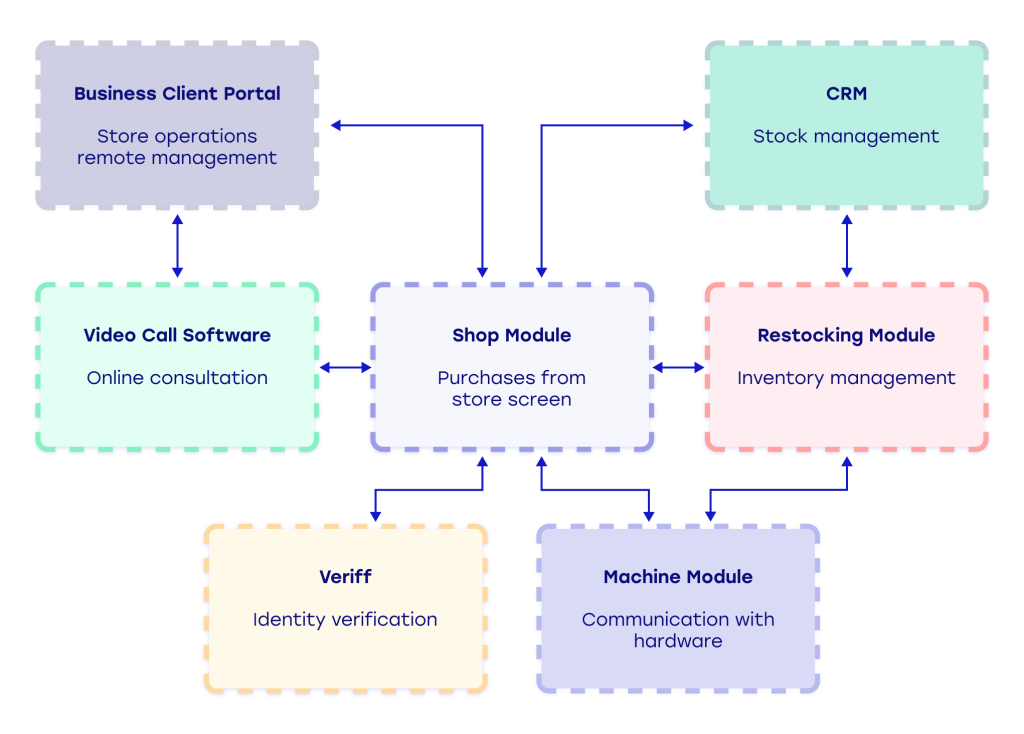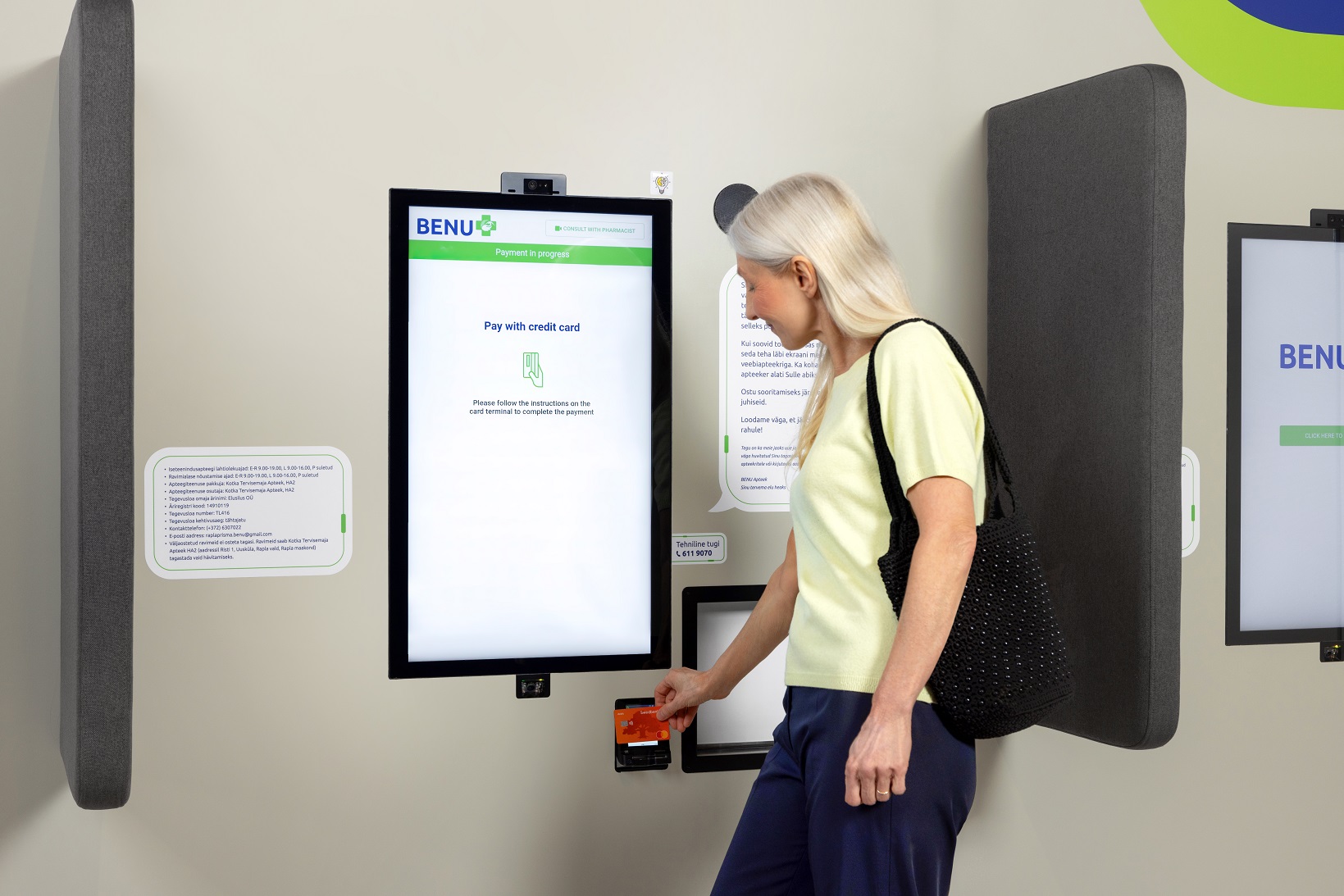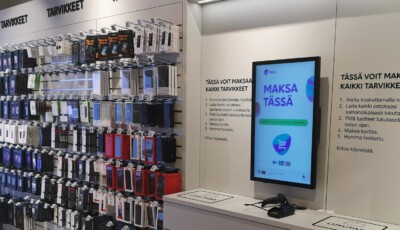Executive summary
Startups looking to disrupt the market with innovative solutions must move fast. However, building in-house development teams requires time and resources, as competition for talent is fierce, and increasing the headcount shortens the company’s runway. That is why the Estonian startup Grab2Go took another route and partnered with external providers to build their next-gen autonomous store platform for businesses.
Read also: Choosing the Right Development Partner for Your Startup: Expert Insights and Strategies
Helmes is in charge of software development in the project. We brought to the project a full development team, including team members with “Internet of Things” (IoT) expertise and previous experience in online pharmacy development projects. We are used to working closely with the client and their hardware development partner after successfully delivering the first project on a very tight schedule.
In 2023, one of the leading pharmacy chains in Estonia, Benu, introduced the pioneering autonomous pharmacy, revolutionizing how customers access their medications and allowing customers to buy over-the-counter medicines while being consulted by a pharmacist via video call.
The solution is designed based on microservices architecture principles and comprises different modules working independently of an Internet connection.
- The customer module enables customers to make purchases.
- The machine module sends commands to the hardware and reads machine statuses.
- The restocking module handles stock management by staff.
- The business client portal is a web application where the client can remotely manage the store operations. The solution is currently integrated with a card payment terminal, e-commerce platform, video call software, and ID verification solution.
Although self-service pharmacies are currently bound by regulations that restrict their operation to the presence of a pharmacist during the apothecary’s opening hours, the groundbreaking solution has already prompted a regulatory review. It holds tremendous potential for addressing the scarcity of 24/7 pharmacies, pending future regulatory changes.
In addition to autonomous pharmacies, the technology has many other use cases by convenience stores, petrol stations, and other businesses seeking to increase operational efficiency and give customers convenient access to their products around the clock. The possibilities include online web store support so customers can pre-order products online and pick up the goods from the autonomous store.
Read from the case study about the platform’s benefits and Helmes’ role in the project.
Meet the customer
Grab2Go is an Estonian startup that develops fully autonomous, modular robotic store technology for convenience stores, pharmacies, and other businesses. Thanks to their autonomous store platform, customers can buy convenience goods, pharmaceuticals, and other products from autonomous stores around the clock. The company’s first autonomous pharmacy for a pilot was launched in Estonia in March 2023.
The challenge
In opting to entrust the development of their next-gen autonomous store to external service providers, Grab2Go made a deliberate choice to forgo an in-house development team. This strategic decision aligned with their vision and enabled them to execute their plans effectively.
In early 2022, Grab2Go partnered with Helmes to undertake the software development part of the project. The process required close collaboration with the company’s hardware development partner to ensure the hardware and software components would combine seamlessly.
The minimum viable product (MVP) had to fulfill the basic store functionalities: allow the customer to purchase and pay while the company could remotely monitor and control all the processes. As the MVP was to be piloted by the pharmacy brand Benu, part of Phoenix Group, it also had to meet specific criteria, such as supporting a remote consultation by a pharmacist as required by Estonian pharmacy law.
The solution – an autonomous pharmacy
Grab2Go’s first autonomous pharmacy, launched in March 2023, allows customers to buy over-the-counter medicines while being remotely consulted by a pharmacist.
How does it work?
- The purchase process – The customer selects the desired product on the touchscreen.
- The system automatically starts a video call with a pharmacist (as currently required by law), allowing the pharmacist and customer to see and talk to each other.
- The customer completes the payment on the card payment terminal and receives the product.
- The system sends an electronic receipt to the customer’s email (as a more sustainable alternative to paper receipts.)
- Restocking – Staff members initiate the restocking process on a dedicated touchscreen. They scan the products and place them on the shelf indicated on the screen (which also displays how many products can still be added). While restocking is in process, customers cannot make purchases and see a respective notice on the customer screen.
- A business client portal – The client can monitor and control store operations in a cloud-based web application.
The pharmacist uses the portal to join the video call with the customer.
In addition, it’s possible to configure store status and opening times. The portal also sends a receipt to the customer’s email after a successful transaction. It could also possibly be used to adjust temperature zones, monitor store performance, access call logs, etc.
Different modules run on the machine independently of Internet connection and manage machine statuses:
- The machine module reads the machine statuses and sends commands to the hardware;
- The customer module allows customers to make purchases;
- The restocking module enables inventory management by staff;
- The business client portal allows the client to manage store operations remotely.
- The software runs on cloud IoT solutions.
- The platform is currently integrated with a card payment terminal, CRM for stock management, video call software, and Veriff for identity verification (not used in the pilot project).
- The system uses MongoDB for a database (recording of orders).
Future possibilities include adding online store support so customers can pre-order products online and pick up the goods from the autonomous store.

The development process
We started collaborating with Grab2Go by mapping the situation and tasks already completed. As a next step, we delivered a fast preliminary estimation with a possible time estimate, after which we proceeded to the development phase.
Because the project combined hardware and software, end-to-end testing was crucial to ensure both worked together seamlessly. The integration of hardware and software was done with the customer, ensuring interoperability with future hardware revisions. As the physical prototype was being developed in parallel with software, we tested UI on a screen module at our office, simulating the machine response. We also did testing with the physical prototype at the client’s location and carried out final tests on the launch site before going live.
Team and daily collaboration
The project team inside Helmes included a team lead, developers, analysts, and a hardware/IoT expert. We also involved a designer at certain phases of the project.
We conducted the development process in weekly cycles. Each week, we had a Review & Design (R&D) meeting with the client, where we reviewed the progress and discussed upcoming tasks. We communicated via Teams, email, and phone between the meetings according to guidelines agreed in advance.
In addition to software development expertise, we were happy to contribute to the project additional specialized know-how. For instance, our hardware and IoT expert provided valuable feedback to the client regarding the IoT solution. At the same time, some other team members had previously worked on an online pharmacy development project at Helmes. They could share their know-how of the sector regulations and liaise with officials for regulatory change, which proved highly valuable for the client.
Work with Helmes
Building your own development team can be costly and time-consuming as you enter a fierce competition for talent. Partnering with an external service provider can fast-track the success of your business by giving you access to an experienced development team with highly specialized skills from day one.
Helmes has been developing custom software for more than 30 years. Our clients include fast-growing startups and multinational companies in telecom, fintech, logistics, healthcare, and other sectors and public institutions.
We’d love to hear from you if you are looking for a custom software development partner.
Get in touch





